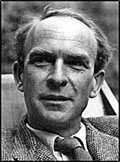P. F. Strawson facts for kids
Quick facts for kids
Peter Strawson
|
|
|---|---|
 |
|
| Born |
Peter Frederick Strawson
23 November 1919 |
| Died | 13 February 2006 (aged 86) London, England
|
| Alma mater | St John's College, Oxford |
| Era | Contemporary philosophy |
| Region | Western philosophy |
| School | Analytic |
| Notable students | Gareth Evans |
|
Main interests
|
Philosophy of language · Philosophy of mind |
|
Notable ideas
|
Ordinary language philosophy Personal reactive attitudes The distinction between sortal and characterising universals The distinction between particular individuals (such as historical events, material objects and persons) and non-particular individuals (such as qualities, properties, numbers, species) The "descriptive metaphysics" and "revisionary metaphysics" distinction |
|
Influences
|
|
|
Influenced
|
|
Sir Peter Frederick Strawson (born November 23, 1919 – died February 13, 2006) was an important English philosopher. A philosopher is someone who studies big questions about life, knowledge, values, and how we understand the world.
He taught at the University of Oxford for many years. He was known for his ideas about how we use language and how we think about the world.
Contents
About Peter Strawson
Sir Peter Strawson was a very respected thinker in the field of Western philosophy. He was part of a group called Analytic philosophers. This group focuses on clear thinking and using logic to solve problems.
His Life and Career
Peter Strawson was born in Ealing, London, in 1919. He studied at St John's College, Oxford. After finishing his studies, he started teaching at University College, Oxford, in 1947. He became a full-time teacher there the next year.
Later, from 1968 to 1987, he held a very important position at Oxford. He was the Waynflete Professor of Metaphysical Philosophy at Magdalen College. Even after he retired in 1987, he kept working at the college until shortly before he passed away in 2006.
What He Studied
Peter Strawson was interested in many areas of philosophy. Two of his main interests were the philosophy of language and the philosophy of mind.
Language and How We Talk
He explored how our everyday language works. This is part of what is called "ordinary language philosophy." It means looking closely at how we use words in normal conversations. He believed that understanding how we use language helps us understand how we think.
How We React to Others
One of his famous ideas was about "personal reactive attitudes." This refers to the feelings and reactions we have towards other people's actions. For example, if someone helps you, you might feel gratitude. If someone harms you, you might feel anger. Strawson explored why we have these kinds of reactions.
Different Kinds of Things
He also looked at how we describe different things in the world. He talked about "sortal" and "characterising universals." This is a bit complex, but it's about how we group things (like "dog" or "chair") and how we describe their qualities (like "red" or "fast").
He also made a difference between "particular individuals" and "non-particular individuals." Particular individuals are specific things like a certain person, a specific event, or a single object. Non-particular individuals are things like qualities (like "bravery"), numbers, or types of things (like "the species dog").
Understanding Metaphysics
Strawson also talked about "descriptive metaphysics" and "revisionary metaphysics."
- Descriptive metaphysics is about describing the basic ideas we already use to think about the world. It's like mapping out how our minds naturally organize reality.
- Revisionary metaphysics tries to change or improve these basic ideas. It suggests new ways to think about how the world works.
He believed that descriptive metaphysics was very important. It helps us understand the fundamental ways humans make sense of their experiences.
Who Influenced Him
Sir Peter Strawson was influenced by other great philosophers. These included Ludwig Wittgenstein, Immanuel Kant, and Bertrand Russell. He also influenced many philosophers who came after him, such as David Lewis and John Searle.
See also
 In Spanish: Peter Frederick Strawson para niños
In Spanish: Peter Frederick Strawson para niños
 | Frances Mary Albrier |
 | Whitney Young |
 | Muhammad Ali |

